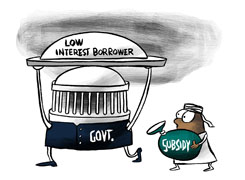Ramalingam Kalirajan |10881 Answers |Ask -Follow
Mutual Funds, Financial Planning Expert - Answered on Jul 10, 2024
He has an MBA in finance from the University of Madras and is a certified financial planner.
He is the director and chief financial planner at Holistic Investment, a Chennai-based firm that offers financial planning and wealth management advice.... more

Hi sir Good morning I have taken busines loan of 75,000 almost a year know we have paid more than 90% amount but still we have to pay 705000 from HDFC Bank
You took a business loan of Rs 75,000 almost a year ago.
You have paid more than 90% of the amount.
You still owe Rs 7,05,000 to HDFC Bank.
Understanding the Discrepancy
There seems to be a misunderstanding or calculation error regarding the loan amount and payments.
Clarifying the Loan Terms
Review your loan agreement to understand the interest rate, tenure, and repayment schedule.
Seeking Clarification
Contact HDFC Bank to clarify the outstanding loan amount and any discrepancies.
Steps to Manage and Pay Off the Loan
1. Detailed Loan Statement
Request a detailed loan statement from HDFC Bank.
This will help you understand the breakdown of the principal amount, interest, and any additional charges.
2. Assessing Repayment Options
Lump Sum Payment
If you have the funds, consider making a lump sum payment to reduce the outstanding amount.
This can save you on interest payments.
EMI Adjustments
Discuss with the bank the possibility of adjusting your EMI.
This can help you manage your monthly cash flow better.
3. Refinancing the Loan
Lower Interest Rates
Check if you can refinance the loan at a lower interest rate.
This can reduce your monthly EMI and total interest outgo.
Extending the Tenure
Consider extending the loan tenure.
This will reduce your monthly EMI but increase the total interest paid.
Improving Cash Flow for Loan Repayment
1. Expense Management
Budgeting
Create a detailed budget to track your income and expenses.
Identify areas where you can cut costs.
Prioritize Payments
Prioritize loan repayments to avoid penalties and additional interest.
2. Increasing Income
Business Revenue
Focus on strategies to increase your business revenue.
This can help you generate more funds for loan repayment.
Additional Income Sources
Consider additional income sources, such as part-time work or freelance opportunities.
3. Emergency Fund
Building an Emergency Fund
Ensure you have an emergency fund to cover unforeseen expenses.
This will prevent you from dipping into loan repayment funds.
Using Savings
If you have savings, consider using a portion to pay off the loan.
This can reduce your debt burden.
Seeking Professional Advice
1. Certified Financial Planner (CFP)
Personalized Guidance
Consult a CFP for personalized financial advice.
They can help you create a detailed repayment plan and manage your finances better.
2. Debt Counseling
Understanding Debt Management
Consider debt counseling services to understand better debt management strategies.
They can help you negotiate with the bank and manage repayments.
3. Legal Advice
Reviewing Loan Agreement
If there are discrepancies in the loan amount, seek legal advice.
A legal expert can help review your loan agreement and identify any issues.
Long-Term Financial Planning
1. Financial Goals
Setting Clear Goals
Set clear financial goals for your business and personal life.
This will help you prioritize and manage your finances better.
2. Investment Planning
Diversifying Investments
Once the loan is paid off, focus on diversifying your investments.
This will help you build wealth and achieve financial stability.
3. Risk Management
Insurance Coverage
Ensure you have adequate insurance coverage for your business and personal life.
This will protect you from unforeseen financial risks.
Final Insights
Comprehensive Review
Conduct a comprehensive review of your loan and repayment plan.
Ensure you understand all the terms and conditions.
Regular Monitoring
Regularly monitor your loan statements and payments.
Keep track of any discrepancies and address them promptly.
Open Communication
Maintain open communication with HDFC Bank.
Seek clarification on any issues and negotiate terms if needed.
Balanced Approach
Take a balanced approach to managing your finances.
Prioritize loan repayment while maintaining a healthy cash flow for your business and personal needs.
Long-Term Perspective
Keep a long-term perspective in mind.
Focus on building financial stability and achieving your long-term financial goals.
Best Regards,
K. Ramalingam, MBA, CFP,
Chief Financial Planner,
www.holisticinvestment.in
You may like to see similar questions and answers below
Ramalingam Kalirajan |10881 Answers |Ask -Follow
Mutual Funds, Financial Planning Expert - Answered on Jan 20, 2025
Ramalingam Kalirajan |10881 Answers |Ask -Follow
Mutual Funds, Financial Planning Expert - Answered on Jul 31, 2025
Dr Dipankar Dutta |1839 Answers |Ask -Follow
Tech Careers and Skill Development Expert - Answered on Dec 13, 2025
Dr Dipankar Dutta |1839 Answers |Ask -Follow
Tech Careers and Skill Development Expert - Answered on Dec 13, 2025
Mayank Chandel |2575 Answers |Ask -Follow
IIT-JEE, NEET-UG, SAT, CLAT, CA, CS Exam Expert - Answered on Dec 13, 2025
Radheshyam Zanwar |6742 Answers |Ask -Follow
MHT-CET, IIT-JEE, NEET-UG Expert - Answered on Dec 13, 2025
Mayank Chandel |2575 Answers |Ask -Follow
IIT-JEE, NEET-UG, SAT, CLAT, CA, CS Exam Expert - Answered on Dec 13, 2025
Mayank Chandel |2575 Answers |Ask -Follow
IIT-JEE, NEET-UG, SAT, CLAT, CA, CS Exam Expert - Answered on Dec 13, 2025
Kanchan Rai |646 Answers |Ask -Follow
Relationships Expert, Mind Coach - Answered on Dec 12, 2025
Ravi Mittal |677 Answers |Ask -Follow
Dating, Relationships Expert - Answered on Dec 12, 2025
Ramalingam Kalirajan |10881 Answers |Ask -Follow
Mutual Funds, Financial Planning Expert - Answered on Dec 12, 2025
Ramalingam Kalirajan |10881 Answers |Ask -Follow
Mutual Funds, Financial Planning Expert - Answered on Dec 12, 2025























